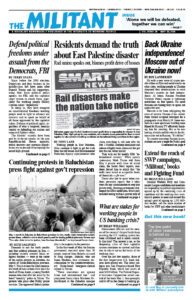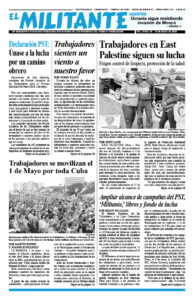Government officials and the owners of the country’s largest banks keep insisting the U.S. banking system has been stabilized and is under control. Is that true? The answer is no, as the deepening crisis of their capitalist system continues to unravel and they aim to take it out on the backs of the working class.
Over the last few months, three of the four largest-ever U.S. bank failures have played out. The latest collapse was San Francisco-based First Republic Bank, which had assets of over $200 billion. The Federal Deposit Insurance Corporation seized control of the bank May 1, then promptly sold it off on the cheap to banking giant JPMorgan Chase.
This came on the heels of the collapse of Silicon Valley Bank and Signature Bank in March. All three catered to a wealthy clientele most of whose deposits were uninsured; that is, the funds they put in the banks were way over the FDIC’s $250,000 insurance limit.
The capitalist rulers are deeply worried that these bank failures will spread, threatening a broader economic crisis in the U.S. and worldwide. The first thing they did was to prioritize protecting the funds of the wealthy. The FDIC shelled out billions of dollars to reimburse capitalist depositors at the Silicon Valley and Signature banks, and Chase guaranteed depositors at First Republic would be fully reimbursed.
Banks seek to grow wealthier by borrowing cheap from the government and then buying bonds from the same government that pays them a higher interest rate — a neat deal, to be sure, in “ordinary” times. But today’s crisis was precipitated by the Federal Reserve’s moves to slow inflation, raising interest rates from nearly zero to 5% over the past 14 months. The value of bonds, mortgage loans and other assets these banks had invested in then declined, bank deposits could no longer be covered, and depositors rushed to withdraw their funds — $100 billion from First Republic in just a few days.
While it’s impossible to predict what will happen next, the volatility of the capitalist rulers’ banking system has been a bellwether in past economic crises. “The next recession will take place under the cumulative effects of a new set of destabilizing economic conditions,” Socialist Workers Party National Secretary Jack Barnes wrote in “U.S. Imperialism Has Lost the Cold War” in New International no. 11. This means “worsening banking crisis; largest-ever debt balloon; continuing stock and bond market instability; renewed vulnerability of working farmers; and stagnant capital investment.”
Some 2,315 U.S. banks sitting on $11 trillion still have fewer assets on their balance sheets than they would need if they were forced to cover their liabilities.
Showing the class divisions in society, neither the FDIC nor any other government agency offers a guarantee to cover the rising debts workers and farmers face from the Fed’s increases in interest rates. These are being reflected in growing debt on our credit cards, auto loans, and home mortgages, as well as rents.
New York City workers’ pension funds invested in Silicon Valley Bank saw $28 million disappear when that bank collapsed. The funds weren’t covered by the FDIC’s bailout of depositors.
Days after First Republic’s collapse there was a run on other regional banks. Stock prices plunged 50% at PacWest, 38% at Western Alliance, along with double-digit declines at Zions, Comerica and others.
What’s posed today is the increasing likelihood of an extended period of stagnation, where continuing inflation is combined with stagnating capitalist production and job losses.
“I think we’ve got a bit of a stagflationary problem developing,” Larry Summers, former treasury secretary under the Bill Clinton administration, told Bloomberg TV April 28. Referring to the Federal Reserve’s hope to get the official inflation rate down to 2% through raising interest rates, he adds, “I don’t think that’s going to get back to target without a meaningful slowdown in the economy.”
U.S. manufacturing declined in March to its lowest level in nearly three years as new orders plunged. Housing sales shrank for the eighth consecutive quarter.
While federal officials “acknowledge that wage gains did not initially cause rapid price increases,” wrote the New York Times May 5, “they worry that it will prove difficult to return inflation to normal with pay gains rising so rapidly.” In fact, when wages go up as a product of union struggles, it just means profits go down. That’s why the bosses target our wages.
Like many workers, Scott Raileanu with his family of four in Deerfield, Illinois, feels squeezed by rising prices for day care, groceries, utilities and gasoline. “The extra things that I don’t need, that beforehand I wouldn’t have batted an eye at purchasing,” the 33-year-old technology worker told the Wall Street Journal, “I’m holding off on. I need that money for groceries.”

